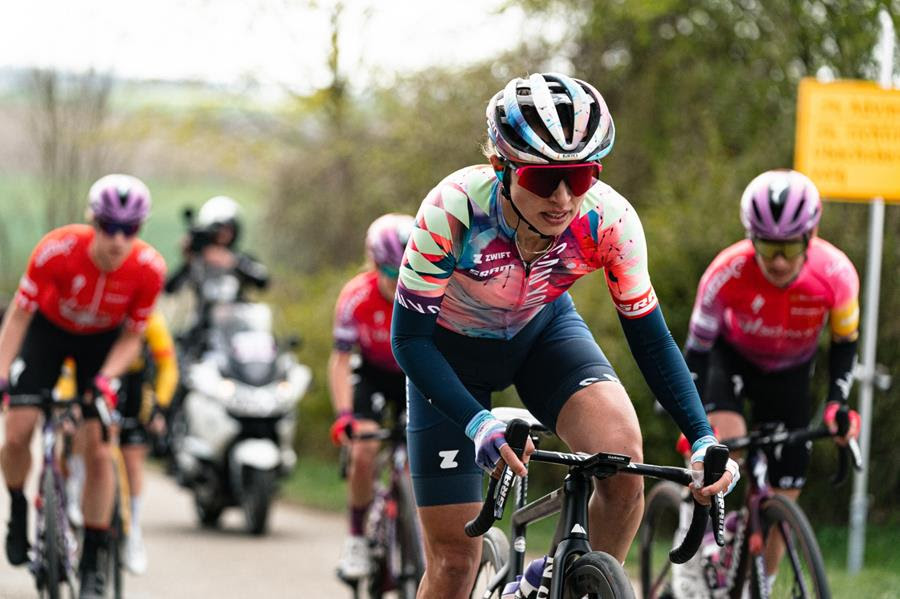‘It's a cruel queen stage’ - Niewiadoma blown away by trio of Saturday climbs at Tour de France Femmes
Petit Ballon, Col du Platzerwasel and Grand Ballon mountain passes to kick off hunt for the overall title

The Tour de France Femmes avec Zwift will hit the first trio of category 1 ascents - Petit Ballon, Col du Platzerwasel and Grand Ballon - that are set to make their mark on the overall classification.
Highly regarded as the queen stage 7 on Saturday, Kasia Niewiadoma (Canyon-SRAM) said she was blown away by its difficulty, calling the route ‘cruel’, and where the yellow jersey could be all but sealed ahead of the finale on Sunday.
“It's definitely super hard. I need to admit that after previewing the seventh stage, I was blown away, and blown away, not necessarily, in a good way,” Niewiadoma told Cyclingnews, who is currently third overall at 30 second behind overall leader Marianne Vos (Jumbo-Visma).
“I set myself thinking that I can do climbs that are around 20 minutes, because the longer they are, the less good I am. So, I was hoping that the climbs on stage 7 would be around 20 minutes but they are longer and steeper than I expected.
“I wasn't really stoked about it. Thankfully, I had five or six weeks to work on those longer climbs. So, now I definitely feel more comfortable and confident ahead of that stage.
“It's super hard. It's the queen stage. It's just very cruel, I feel.”
The 127.1km route between Sélestat and Le Markstein includes three challenging passes that begin with the Petit Ballon, a 9km ascent with an average gradient of 8.1%.
The latest race content, interviews, features, reviews and expert buying guides, direct to your inbox!
"In my opinion, the first climb is the hardest. When you do the hardest climb first and then you're pretty much done, tired, and then you're like, wow, there's still two more to go,” Niewiadoma said.
“If Annemiek van Vleuten is having a good day, I wouldn't be surprised if she attacks on the first climb of Petit Ballon. We have, as I said, a climb, Petit Ballon, then a short descent, and then another climb, Col du Platzerwasel. On just two climbs you can easily make up to five minutes, and then you jump down to the valley, you have like 10km and then you start climbing again.”
The middle climb, Col du Platzerwasel, is 7.1km and while it has an average gradient of 8.3% and it peaks at roughly the half-way mark of the stage. Niewiadoma said that it will be important to stay adequately fuelled during this stage.
“Fuelling-wise, it's interesting because you climb for 30 minutes, and, you know, when you go hard, it's always hard to fuel yourself because you're just like, don't focus on eating. I felt during this stage preview, how important it's gonna be to just stay on top of everything in order to arrive to the final climb, in a position to be able to do your best,” Niewiadoma said.
“I feel like on this stage, you can lose not because of lack of the power, but because of under-fuelling and hydration. It's very interesting stage, and it forces you to be so concentrated and focused on riding and pushing hard, but then the smaller important things could be forgotten.”
The Grand Ballon is the longest ascent at the Tour de France Femmes, and comes at the end of what many believe is the hardest stage, peaking at the 119.9km mark. The climb averages a more moderate 6.7%, but the final 6km will be a true test of climbing ability with a steady 8.5% all the way over the top.
There will be little reprieve for the riders as they crest the Grand Ballon because the route will follow the ridge for an undulating 8km to the finish line in Le Markstein.
“I wouldn't be also surprised to just see peloton shredded into pieces, and riders arriving in five-persons groups, or something like that. The Grand Ballon from the turn to the left, it's like 15km. I know that VeloViewer says that it's shorter 10km climb, but it keeps dragging up like 15km to the finish of the mountain. We keep dragging for like so long. It's definitely tiring, just destroys you, totally,’ Niewiadoma said.

Kirsten Frattini is the Deputy Editor of Cyclingnews, overseeing the global racing content plan.
Kirsten has a background in Kinesiology and Health Science. She has been involved in cycling from the community and grassroots level to professional cycling's biggest races, reporting on the WorldTour, Spring Classics, Tours de France, World Championships and Olympic Games.
She began her sports journalism career with Cyclingnews as a North American Correspondent in 2006. In 2018, Kirsten became Women's Editor – overseeing the content strategy, race coverage and growth of women's professional cycling – before becoming Deputy Editor in 2023.